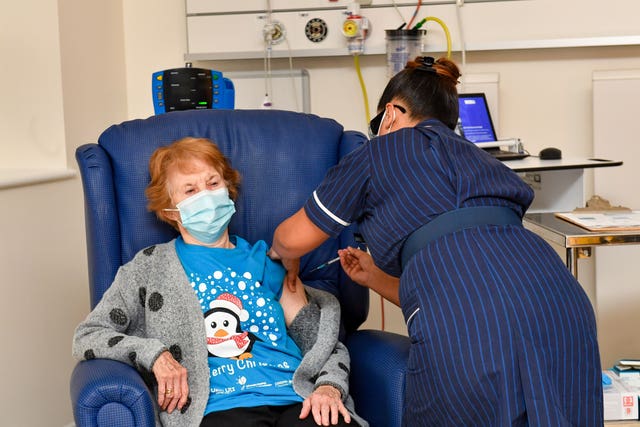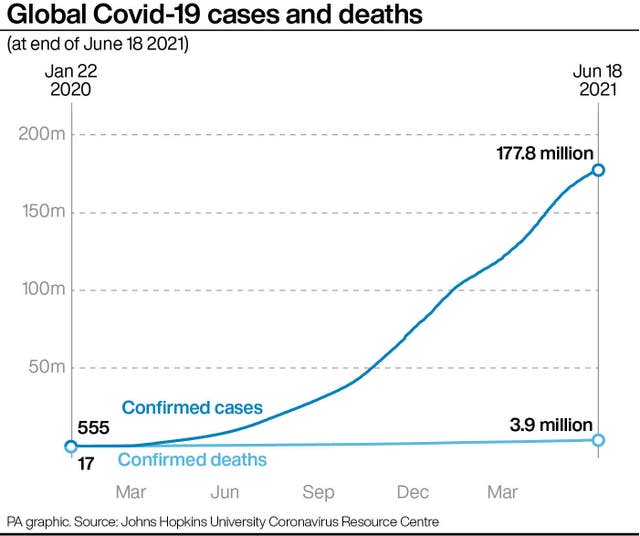
The race is on between the Covid-19 vaccine and a third wave of the virus but there are grounds for cautious optimism, advisers to the UK Government have said.
The experts’ comments come after Public health England said there has been a 79% rise in one week in cases of the Delta variant first identified in India.
The increase across the UK is being driven by younger age groups, many of whom have now been invited for a vaccination as the jab rollout extends to anyone aged 18 and over.
Everyone aged 18 and over in England is now eligible for the #COVID19 vaccination.
Please come forward to make your first appointment or get your second dose.
Book here: https://t.co/nmFGy06INb pic.twitter.com/AnLy8dokcD
— Department of Health and Social Care (@DHSCgovuk) June 18, 2021
Hospital cases across the UK have almost doubled although most of those needing treatment have not had a vaccine.
READ MORE: As Israel ends Covid restrictions, are vaccines already slowing UK third wave?
Professor Adam Finn, who advises the UK Government on the Joint Committee on Vaccination and Immunisation (JCVI), said a “third wave” of coronavirus infections “is definitely under way”.
The University of Bristol academic told BBC Radio 4’s Today programme: “It’s going up, perhaps we can be a little bit optimistic it’s not going up any faster, but nevertheless it’s going up, so this third wave is definitely under way.
“We can conclude that the race is firmly on between the vaccine programme, particularly getting older people’s second doses done, and the Delta variant third wave.”
READ MORE: Nicola Sturgeon confirms more than 900 fresh cases identified
Prof Finn said the JCVI is still working to decide whether children should be vaccinated but said that effort would not be the immediate priority if it was approved.
“Even if some decision were made to immunise children it wouldn’t be appropriate right now, either here or anywhere else in Europe, to give our doses predominantly to children because it’s adults that get sick, so vaccinating adults is clearly the priority right now,” he said.
Prof Finn was asked if he feels confident that we are going to outpace the Delta variant with the current rate of vaccination, and he told Times Radio: “No, I don’t feel confident, but I think there’s some grounds for optimism.
“The latest ONS figures continue to show a rise, but that rise has not accelerated quite as much as I’d feared over the last week.
“So, the race is on. The sooner we can get, particularly second doses, into older people, the less of a hospitalisation wave we’ll see this time around.
 Margaret Keenan was he first person in the United Kingdom to receive the Pfizer/BioNtech Covid-19 vaccine at University Hospital, Coventry (Jacob King/PA)
Margaret Keenan was he first person in the United Kingdom to receive the Pfizer/BioNtech Covid-19 vaccine at University Hospital, Coventry (Jacob King/PA)
“That’s the critical thing, that’s what’s grounded us all in the past, and if we’ve managed to protect enough older people that we can avoid a great big surge of hospitalisations and deaths, then things will be able to move back towards normal.”
Dr Mike Tildesley, epidemiologist and a member of the SPI-M modelling group, said he is “cautiously hopeful” that the number of Covid-19 hospital admissions over the next few weeks will not be on the same scale as happened in January.
He said those going to hospital at the moment tend to be slightly younger and “slightly less sick”.
He told BBC Breakfast: “Currently we’re seeing slightly younger people are becoming infected, and actually the people going to hospital tend to be slightly younger, and therefore also slightly less sick, which is again quite a good sign that even if we’re starting to see more people going into hospital they tend to be younger people who have higher likelihood of recovering successfully.
“I realise I’m being slightly cautious here. All of these are cautiously good signs but, of course, we do need to keep an eye on this over the next couple of weeks so that we can give as much information as we can to the Government prior to the 19th of July reopening.”
 (PA Graphics)
(PA Graphics)
The warnings of a third wave come after the number of cases confirmed in Scotland rose to it's hightest level in six months this week.
Thursday's total of 1,317 was the highest recorded since january this year, when much of the country was in lockdown.
Yesterday, Nicola Sturgeon has confimed that there have been more than 900 new cases of coronavirus identified in Scotland since then.
The First Minister said during a televised briefing that 950 new cases of the virus have been recorded since Thursday, while two people had died and 128 were in hospital because of Covid.



Why are you making commenting on The Herald only available to subscribers?
It should have been a safe space for informed debate, somewhere for readers to discuss issues around the biggest stories of the day, but all too often the below the line comments on most websites have become bogged down by off-topic discussions and abuse.
heraldscotland.com is tackling this problem by allowing only subscribers to comment.
We are doing this to improve the experience for our loyal readers and we believe it will reduce the ability of trolls and troublemakers, who occasionally find their way onto our site, to abuse our journalists and readers. We also hope it will help the comments section fulfil its promise as a part of Scotland's conversation with itself.
We are lucky at The Herald. We are read by an informed, educated readership who can add their knowledge and insights to our stories.
That is invaluable.
We are making the subscriber-only change to support our valued readers, who tell us they don't want the site cluttered up with irrelevant comments, untruths and abuse.
In the past, the journalist’s job was to collect and distribute information to the audience. Technology means that readers can shape a discussion. We look forward to hearing from you on heraldscotland.com
Comments & Moderation
Readers’ comments: You are personally liable for the content of any comments you upload to this website, so please act responsibly. We do not pre-moderate or monitor readers’ comments appearing on our websites, but we do post-moderate in response to complaints we receive or otherwise when a potential problem comes to our attention. You can make a complaint by using the ‘report this post’ link . We may then apply our discretion under the user terms to amend or delete comments.
Post moderation is undertaken full-time 9am-6pm on weekdays, and on a part-time basis outwith those hours.
Read the rules hereLast Updated:
Report this comment Cancel